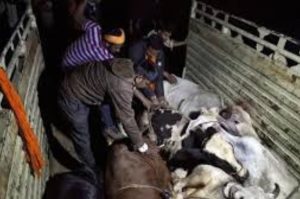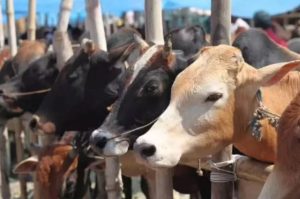Agartala, June 5, 2025 – With Bakri Eid (Eid al-Adha) just days away, communal sensitivities and religious sentiments in Tripura have been stirred again as the Sanatani Hindu Sena submitted a formal deputation to the District Magistrate of West Tripura, demanding a complete ban on cow slaughter across the state. The demand, citing the sacred status of cows in Hinduism, has reignited debates over religious freedom, animal welfare, and the scope of state intervention in cultural practices.
This development comes amid rising polarization over religious festivals in northeastern states and across India, raising important questions about constitutional rights, secular governance, and social harmony.

Sacredness of the Cow: Religious Sentiments Behind the Demand
The Sanatani Hindu Sena, a Hindu nationalist organization with growing influence in Tripura’s socio-political landscape, argued in its deputation that the slaughter of cows during Bakri Eid is a direct affront to Hindu religious values.
“In Sanatan Dharma, the cow is a motherly figure. The cow is revered, worshipped, and protected. The killing of such a sacred animal during any festival, especially publicly, deeply hurts our sentiments,” said Mahendra Debbarma, president of the Hindu Sena’s Tripura unit, during a press conference following the deputation.
They demanded strict legal enforcement of existing laws that prohibit cow slaughter, especially those relating to the Prevention of Cruelty to Animals Act and relevant state-level rules.


This appeal to state authorities reflects similar demands made across various parts of India in recent years, especially in the run-up to religious festivals such as Bakri Eid, which traditionally involves the ritual sacrifice of goats, sheep, and in some regions, cows or bulls.
Tripura’s Religious Demographics and Historical Tensions
Tripura has a delicately balanced religious composition, with Hindus forming around 83% of the population and Muslims accounting for approximately 8%. Despite the minority status, Muslims in Tripura have historically coexisted peacefully with the majority Hindu community, participating in each other’s festivals and rituals.
However, over the past decade, rising religious nationalism and political polarization have impacted the communal fabric. Events such as the Tripura mosque vandalism incidents in 2021, followed by isolated acts of religious provocation, have left deep scars.
In this context, the demand to ban cow slaughter during a key Islamic festival is being seen by many Muslim leaders as an attempt to undermine their religious freedom under the guise of protecting animal rights.
“We respect Hindu sentiments, but Islam has its own traditions. On Bakri Eid, we follow what is written in the Quran. This demand, if enforced selectively, would violate our constitutional rights,” said Mohammad Jamil, spokesperson of the Tripura Muslim Council.
Legal Framework: What the Law Says About Cow Slaughter in Tripura
India does not have a uniform national ban on cow slaughter. Instead, each state is allowed to legislate independently on the matter under the Constitution’s Concurrent List.
In Tripura, the slaughter of cows is prohibited under the Tripura Animal Slaughter Control Act, 1959, which states that no person shall slaughter any cow unless it is certified by a competent authority to be over a certain age or diseased beyond recovery.
However, animal slaughter in general is allowed in licensed abattoirs, especially during religious festivals, provided certain guidelines are followed:
-
Only permitted species (usually goats, sheep, and buffaloes) can be slaughtered.
-
Licensed slaughterhouses must be used.
-
Proper sanitation and cruelty prevention measures must be observed.
The Tripura High Court has, in the past, emphasized the need to balance animal rights with religious freedom, stating that “constitutional secularism implies mutual respect of religious practices, not their eradication.”
The Bakri Eid Ritual and Its Significance
Bakri Eid, also known as Eid al-Adha, is one of the most sacred Islamic festivals. It commemorates the willingness of Prophet Ibrahim (Abraham) to sacrifice his son in obedience to God. However, God intervened and provided a ram to sacrifice instead.
Muslims across the globe symbolically reenact this event by sacrificing animals, usually goats or sheep. In some regions, buffaloes or bulls are also sacrificed, depending on local customs and availability.
Importantly, Islamic law mandates the ethical treatment of animals and insists on humane slaughtering practices. Meat from the sacrificed animal is distributed in three parts — among family, friends, and the poor — making it both a spiritual and social festival.
Opposition and Political Responses
The deputation from the Hindu Sena has led to mixed reactions from political leaders and civil society.
The BJP-led state government has maintained a cautious stance. While acknowledging the religious sentiments of Hindus, state officials have emphasized that the law of the land will be upheld, and no community will be targeted unfairly.
“The state government is committed to maintaining peace and law. While religious sentiments are important, any action will be guided strictly by legal provisions. No one should take the law into their own hands,” said Law Minister Pranajit Singha Roy.
The Congress and CPIM, both of which have a secular base in Tripura, have criticized the Hindu Sena’s move, calling it an “attempt to communalize” a peaceful festival.
“This is a deliberate provocation. If the aim is genuinely to protect animals, why is this issue raised only during Muslim festivals?” questioned CPIM leader Pabitra Kar.
Muslim Community Reacts with Restraint, Appeals for Harmony
In response to the Hindu Sena’s demand, several Muslim leaders and clerics in Tripura have called for dialogue and peaceful coexistence.
“We appeal to all communities to maintain brotherhood. No festival should become a reason for division,” said Maulana Asrarul Haque, head of the Agartala Shahi Masjid.
Muslim NGOs and social workers have also stepped up awareness campaigns encouraging ethical practices during Bakri Eid, including:
-
Using permitted animals only.
-
Avoiding public slaughter or display of animal remains.
-
Following municipal guidelines and cleanliness norms.
Some Muslim families have voluntarily opted for goat sacrifices only this year to avoid controversy and maintain peace.
Cow Slaughter Ban in Tripura: Past Precedents and Legal Interventions in Other States
The issue of cow slaughter during Bakri Eid is not unique to Tripura. In states like Uttar Pradesh, Madhya Pradesh, and Gujarat, which have strict cow protection laws, similar tensions have emerged during Eid.
In 2022, the Supreme Court refused to entertain a PIL seeking a nationwide ban on cow slaughter during Bakri Eid, stating that religious freedom is protected under Article 25 of the Constitution, and any ban must follow legislative and legal procedures, not communal sentiments.
However, courts have also directed that slaughter must not violate existing local or state laws, and animal cruelty laws must be strictly followed.
Animal Rights vs Religious Freedom: The Constitutional Tightrope
This issue brings into focus the delicate balance between animal welfare and religious freedom — both enshrined in the Indian Constitution.
-
Article 25 guarantees the right to freely practice and propagate one’s religion.
-
Article 48 directs the state to organize agriculture and animal husbandry on modern lines and specifically mentions the prohibition of cow slaughter.
-
Article 51A(g) imposes a duty on every citizen to show compassion to all living creatures.
Legal experts argue that neither right is absolute, and the Supreme Court has repeatedly held that religious practices can be regulated in the interest of public order, morality, and health.
“A blanket ban on cow slaughter may be seen as majoritarian imposition if not backed by law. Conversely, allowing unregulated animal killing can violate animal welfare statutes. A judicially balanced approach is essential,” said senior advocate Meenakshi Arora.
Administrative Measures Ahead of Bakri Eid 2025
In light of the growing debate, the Tripura administration has issued fresh advisories:
-
No public slaughtering will be allowed under any circumstance.
-
Sacrifice of animals must be done in authorized slaughterhouses.
-
CCTV surveillance will be installed at markets and abattoirs.
-
The Municipal Corporation of Agartala has issued detailed sanitation guidelines.
-
A helpline for animal cruelty complaints has been activated.
Police officials have been instructed to remain on high alert and prevent any potential law and order disturbance. Any attempt at vigilante action or incitement through social media will be dealt with strictly.
Social Media, Rumors, and the Role of Digital Vigilance
As the festival draws near, social media platforms like WhatsApp, Facebook, and X (formerly Twitter) have seen a spike in inflammatory posts, fake videos, and communal rumors.
The Tripura Cyber Crime Unit has issued warnings against the circulation of fake videos showing cow slaughter, many of which are found to be from other states or countries.
“We urge citizens to verify before sharing any content. Rumor-mongering will attract legal action under the IT Act and IPC,” said an official statement.
Digital volunteers from civil society have also stepped in to counter fake narratives and promote interfaith unity using hashtags like #PeacefulEidTripura and #UnityInDiversity.
Voices from the Ground: What Citizens Say
To understand the mood, our reporters spoke with residents from both communities in Agartala and Udaipur:
Rajiv Saha, a shopkeeper in Battala:
“I’m a Hindu, and yes, cows are sacred to us. But I’ve lived beside Muslim neighbors all my life. We respect each other’s festivals. There should be no politics in religion.”
Sabina Khatun, a homemaker in Dharmanagar:
“Eid is a time of giving and sacrifice. We don’t want conflict. If the government asks us not to sacrifice cows, we won’t. But please don’t insult our religion.”
Conclusion: Can Harmony Be Sustained Amid Rising Demands?
The demand for a cow slaughter ban in Tripura ahead of Bakri Eid has brought forward complex questions of religion, law, animal rights, and co-existence. As the state walks the legal tightrope, the need for mutual respect and constitutional compliance has never been greater.
With vigilant administration, responsible religious leadership, and an informed public, Tripura can set an example of how to handle sensitive cultural issues with grace and legality.
But if the issue is hijacked for political gain or communal polarization, the delicate harmony that defines the state’s ethos could be at risk.
External Do Follow Links:
Also read: Home | Channel 6 Network – Latest News, Breaking Updates: Politics, Business, Tech & More

